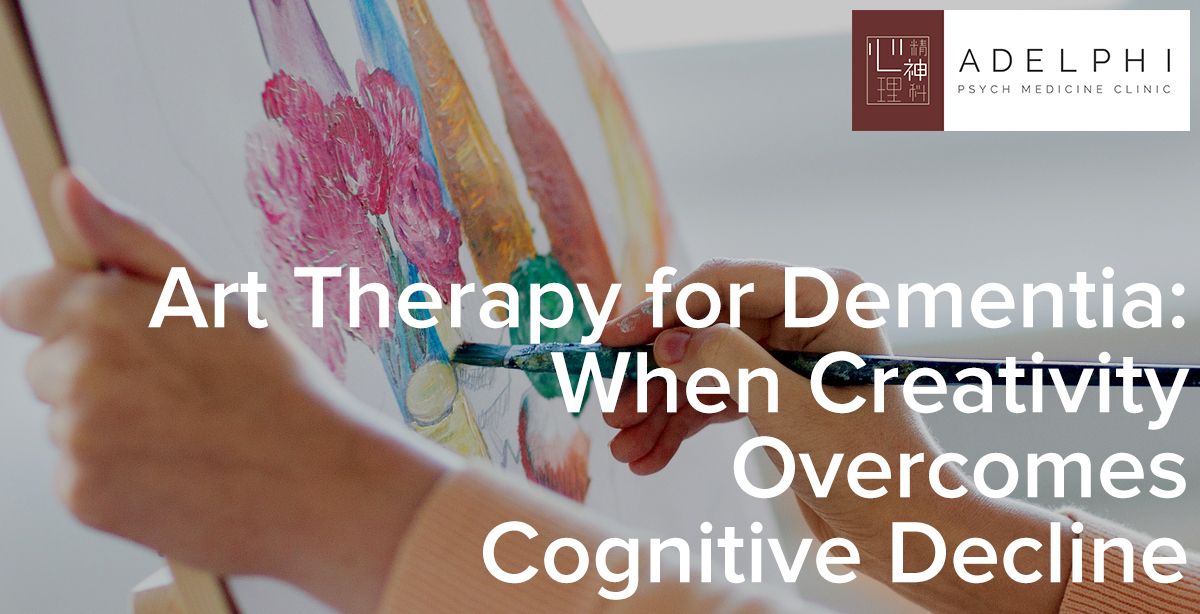
Treating dementia is possible in a number of ways. Social interventions, medicinal therapies and art therapy are some of the common approaches. These have been employed successfully by mental health professionals in Singapore, allowing elderly patients to express their grief and socialise more effectively.
Over the years, numerous studies have confirmed the benefits of art therapy in the treatment of dementia.
Dementia: A Growing Problem Across the World
Dementia has become a major cause of disability across the world. According to the World Health Organization (WHO), 50 million people globally live with dementia. There are 10 million cases being diagnosed every single year.
Alzheimer’s disease is the most common cause of dementia. It contributes to anywhere between 60 and 70 per cent of the cases.
Dementia is a chronic and progressive syndrome. It is characterised by the loss of cognitive function beyond what’s considered a normal consequence of aging. Dementia affects predominantly memory, orientation, critical thinking, comprehension, one’s learning capacity and judgment without having an impact on consciousness.
Currently, dementia affects approximately five to eight per cent of the worldwide population aged 60 and over. What’s most troubling is the rapid increase in new dementia cases. Forecasts suggest that the number of people diagnosed worldwide will reach 82 million by 2030 and 152 million people by 2050.
These worldwide statistics are valid for Singapore, as well.
Dementia has been on the rise in Singapore according to the Wellbeing of the Singapore Elderly (WISE) study. Conducted by the Institute of Mental Health, the study suggests that one in 10 people aged 60 or older is affected by dementia.
In 2012, 28,000 Singaporeans aged 60 or older lived with dementia. The number is anticipated to go up to 80,000 by 2030.
Creative Art Therapy for Dementia Treatment
Various types of art can have therapeutic benefits for the treatment of dementia.
Every single type of art therapy engages the imagination and encourages self-expression, regardless of the patient’s state of mind.
It’s not necessary for people to be particularly artistic in order to enjoy the benefits of this kind of dementia therapy. Paint, clay and paper allow for better self-awareness and the creation of imagery for self-expression purposes.
These, however, aren’t the only kinds of art that dementia patients can benefit from.
Research suggest that drama and theatre are also excellent choices. Role play and improvisation allow for the creation of new memories and they encourage problem-solving skills. In addition, theatre-based therapy usually takes place in group settings. This way, it encourages social interactions between the participants.
Dance, movement and music therapy have also been employed to treat dementia patients and give them a creative outlet. Through dance, dementia patients can engage in a very specific way of non-verbal communication. Music is an excellent choice for the treatment of anxiety and even the depression linked to dementia.
How Does Art Therapy Help with Dementia?
As you’ve seen already, art therapy can produce an array of self-expression, communication and cognitive awareness benefits for the elderly individuals that are struggling with dementia.
Coming together to create art is another very important component of the art therapy. It reduces the risk of social withdrawal and the linked depression – two very common consequences of dementia among the elderly.
Studies show that theatre-based therapy specifically can improve the quality of life by awakening memories and helping the patients remember troubling past moments and work through those. Drama is also very beneficial for overcoming grief, cognitive and even age-related physical decline.
Research about visual art therapy suggests that it improves both the mood and the cognitive abilities of elderly patients. These are long-lasting and extend to the period following the therapy.
These are the reasons why art therapy can benefit a wide array of patients apart from dementia sufferers. It’s ideal for those dealing with anxiety, depression or chronic stress, it helps people on a crossroad looking for a deeper level of self-awareness, survivors of trauma/abuse, couples facing relationship problems and children with emotional/developmental/behavioural issues.
Flashes of Joy Amid Darkness
Those who suffer from dementia eventually develop difficulties recognising their loved ones, they experience behavioural changes, language and communication problems, serious memory disturbances and they become entirely dependent on assisted self-care.
The process of losing one’s cognitive abilities and memories can be confusing and frightening. Art therapy produces feelings of joy amid this troubling time.
Even if the positive moments produced by art therapy are small and fleeting, they can have a lasting impact on the condition and the mood of dementia patients.
Art therapy originated as a sub-niche of psychotherapy in the 1940s. It’s not new, high-tech, expensive or difficult to implement. The selection of the specific intervention depends on the needs of the patient and the choices that a qualified art therapy facilitator, who is usually a psychologist or psychotherapist, makes to tailor the treatment to the condition.
This kind of therapy provides an alternative channel of communication, especially when dementia patients experience diminished language abilities. It stabilises mood, alleviates the burden on caregivers and deepens the relationship between the patient and the therapist.
The simplicity of art therapy, as well as the ease of implementation and the positive results all justify the pursuit of art therapy for the slowdown of cognitive decline in dementia patients.
If a person you love is struggling with dementia, you should consider a consultation at a mental health clinic in Singapore, be it a psychiatrist, psychologist or a psychotherapist with a specialty in art therapy and most often, experienced professionals will suggest a multi-disciplinary approach
Adelphi Psych Medicine Clinic offers art therapy that facilitates communication and allows dementia sufferers to reach a part of themselves that may be difficult to access otherwise. In our experience, patients consider art therapy much less threatening than other kinds of psychotherapy and psychiatric interventions.
To learn more about what happens in an Adelphi Psych Medicine Clinic art therapy session, contact us today or give us a call at 62509833.


